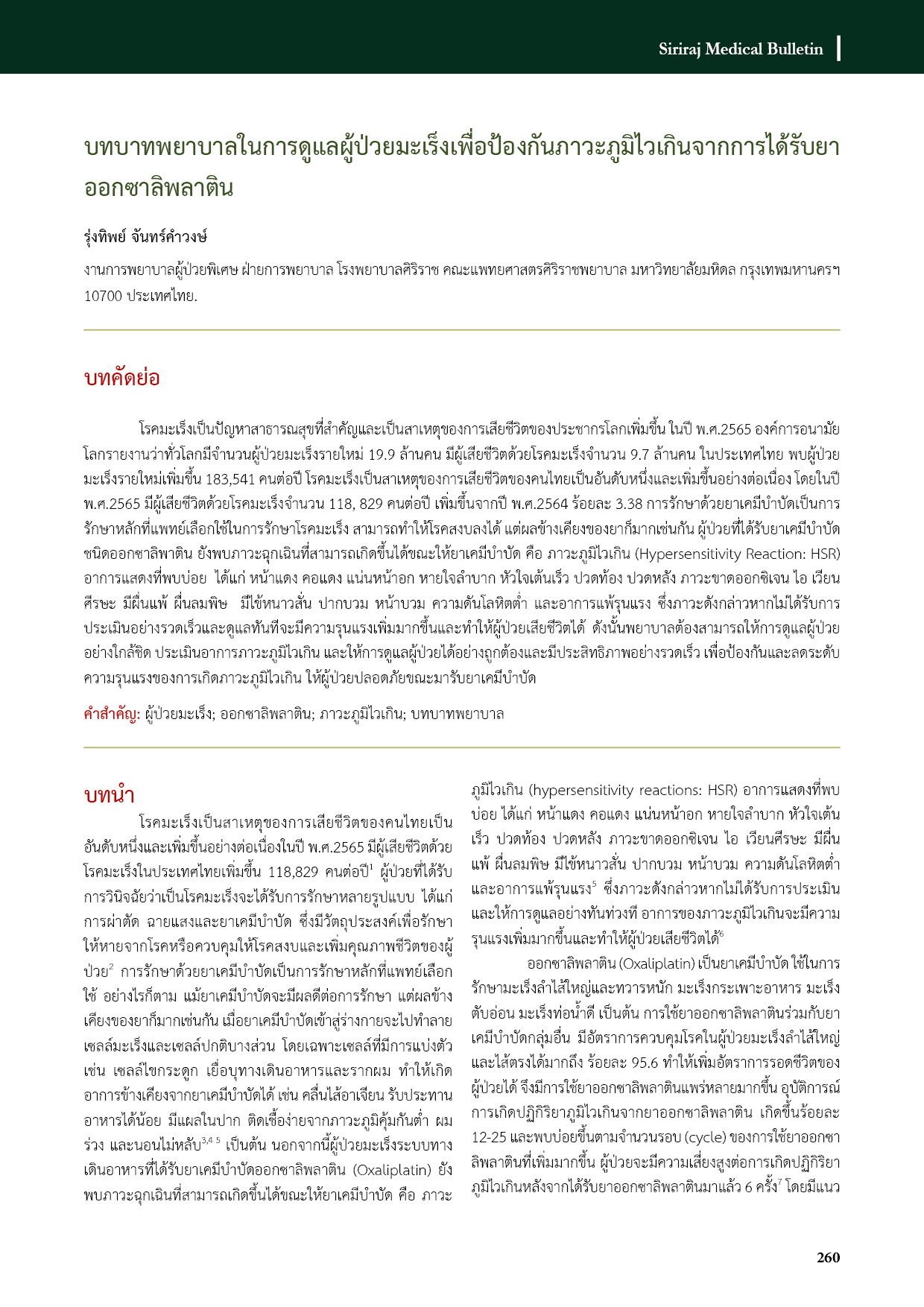The Role of Nurses in Caring for Cancer Patients to Prevent Hypersensitivity Reactions from Receiving Oxaliplatin
Main Article Content
Abstract
Cancer is a major public health problem and the cause of an increasing number of deaths worldwide. In 2022, the World Health Organization reported that there were 19.9 million new cases of cancer worldwide, with 9.7 million people dying from cancer. In Thailand, 183,541 new cancer patients are found per year. Cancer is the leading cause of death for Thai people and continues to increase in 2022, with 118,829 cases in Thailand, an annual increase of 3.38 percent from 2021.Chemotherapy is the main treatment that doctors choose to treat cancer. While it can calm the disease, the drug's side effects are significant. Patients receiving oxaliplatin chemotherapy also encounter emergency conditions that can occur while giving chemotherapy, namely hypersensitivity. (Hypersensitivity Reaction: HSR). The most common symptoms include flushed face or neck, chest discomfort, dyspnea, tachycardia, abdominal pain, back pain, hypoxia, cough, dizziness, allergic rashes (Urticarial rash), fever and shaking chills, swollen lips, facial edema, hypotension and anaphylaxis. This condition, if not evaluated quickly and treated immediately, will become more severe and cause the patient's death. Therefore, nurses must be able to closely care for patients. Assess for symptoms of hypersensitivity and provide accurate and efficient care to patients quickly to prevent and reduce the severity of hypersensitivity. Keep patients safe while receiving chemotherapy.
Article Details

This work is licensed under a Creative Commons Attribution-NonCommercial-NoDerivatives 4.0 International License.
References
International Agency for Research on Cancer. Latest global cancer data. [Internet]. 2022.[cited 2023 Dec 25]. Available from: https://gco.iarc.fr/today/data/factsheets/cancers/39-All-cancers-fact-sheet.pdf.
Albreht, T., Moreno, M.-M., Jelenc, M., Gorgojo, L., & Harris, M. European guide for qualitynational cancer control programmes. Slovenia: National Institute of Public Health, Trubarjeva 2, 1000 Ljubljana;2015.
Cancer care. Understanding and Managing Chemotherapy Side Effects. [Internet]. 2018:[cited 2023 Dec 25]. Available from: https://media.cancercare.org/publications/original/24ccc_chemo_side_effects.pdf.
ณัฐวุธิ สิบหมู่. เภสัชวิทยา เนื้อหาสำคัญและแบบฝึกหัด (Phamacology: principles and exercises). พิมพ์ครั้งที่ 2. กรุงเทพฯ: โฮลิสติก พับลิชชิ่ง;2559.
Elie R, Florence LR, Cristina S, Marine V, Valérie B, Michel D, et al. Rechallenge After Oxaliplatin-Induced Hypersensitivity Reactions. JAMA Oncology. 2023;9(3):434-5.
อัจฉราภรณ์ ม่วงมุลตรี, ศิรินทรา โคตะโน. ผลการพัฒนาแนวปฏิบัติการพยาบาลผู้ป่วยมะเร็งเพื่อป้องกันภาวะภูมิไวเกินจากการได้รับยาเคมีบำบัด แผนกผู้ป่วยนอกหน่วยเคมีบำบัด โรงพยาบาลร้อยเอ็ด. วารสารวิจัยและพัฒนานวัตกรรมทางสุขภาพ. 2563;1(2):115-22.
Barbara BR, Terri C, Caralyn B, Nicole R, Anthony JO, Crystal SD. Oxaliplatin detection and management of hypersensitivity reactions. Clin. J. Oncol. Nurs. 2019;23:68.
Suenaga M, Mizunuma N, Matsusaka S, Shinozaki E, Ozaka M, Ogura M, et al. Phase II study of reintroduction of oxaliplatin for advanced colorectal cancer in patients previously treated with oxaliplatin and irinotecan: RE-OPEN study. Drug Des Devel Ther. 2018;35(5):65.
สุจิรา ฟุ้งเพื่อง. บทบาทการพยาบาลในการจัดการภาวะภูมิไวเกิน และปฏิกิริยาจากการให้ยาเคมีบำบัดทางหลอดเลือดดำ. วารสารโรคมะเร็ง. 2561;38(1):29-41.
ภัทราภา ขุนศักดิโยดม. ผื่นผิวหนังจากยาcytarabine: การทบทวนวรรณกรรมและกรณีศึกษา. วารสารโรคมะเร็ง. 2559;36(4):159-69.
ธนะบุญ ประสานนาม. ผื่นแพ้ทางผิวหนังในผู้ป่วยมะเร็งจากการได้รับยาเคมีบำบัดศูนย์มะเร็ง โรงพยาบาลราชบุรี. วารสารวิชาการสำนักงานสาธารณสุขจังหวัดมหาสารคาม. 2564;5(10):55-62.
รุ่งนภา พิมโพธิ์. การพัฒนาแนวทางการป้องกันภาวะภูมิไวเกินจากยา Oxaliplatin ในผู้ป่วยมะเร็ง โรงพยาบาลตากสิน. กลุ่มงานเภสัชกรรม กลุ่มภารกิจด้านบริการตติยภูมิ โรงพยาบาลตากสิน สำนักการแพทย์ [อินเทอร์เน็ต]. 2566. [เข้าถึงเมื่อ 28 ธ.ค. 2566]. เข้าถึงได้จาก: https://webportal.bangkok.go.th/user_files/400/6750953064bf73b3be1a60.31253707.pdf.
Selcuk A, Yildiz B. Oxaliplatin-induced hypersensitivity reactions: risk factors and management. European Review for Medical and Pharmacological Sciences. 2023;27:2640-5.
Fumitaka K, Takeshi A, Takafumi T, Kentaro K, Ryoichiro K, Hiroki S, et al. Differentiating between Laryngopharyngeal Dysesthesia and Hypersensitivity Reactions to Oxaliplatin and Addressing Dyspnea: 2 Case Reports. Case Reports in Oncology. 2023;16:346-52.
ชลิตา ละกำปั่น. การวิจัยคลีนิกแบบสุ่มเปิดเผยชื่อยาในการให้ยาต้านฮิสตามีนและการบริหารยาช้าลง เพื่อป้องกันการเกิดปฏิกิริยาการแพ้แบบภูมิไวเกินต่อยาอ๊อกซาลิพลาติน. Chulalongkorn University Theses and Dissertations (Chula ETD). 2020.3965.
ฐิชกาญจน์ จันทสิริยากร. การศึกษาอุบัติการณ์การเกิดปฏิกิริยาการแพ้แบบภูมิไวเกินขณะบริหารยาทางเส้นเลือดหลังการให้ยายาแอนตี้ฮิสตามีนในผู้ป่วยที่ได้รับการรักษาซ้ำด้วยยาเคมีบำบัดอ๊อกซาลิพลาติน. Chulalongkorn University Theses and Dissertations (Chula ETD). 2018.3623.
สมชาย เป๊กเตปิน, พัทธมน สนิท, วีรวรรณ พรหมคา, ทิพย์เนตร มหามิตร, ภาณุวัฒน์ ไตรธรรม, ณัฐ นาเอก, นทพร ชัยพิชิต. ประสิทธิผลของการปรับสูตรยานก่อนให้ยาเคมีบำบัดต่อการเกิดปฏิกิริยาภูมิไวเกินในผู้ป่วยมะเร็งลำไส้ใหญ่และลำไส้ตรงที่ได้รับยาเคมีบำบัดสูตร FOLFOX: การศึกษานำร่อง. ไทยเภสัชศาสตร์และวิทยาศาสตร์สุขภาพ. 2564;16(3):211-18.
Francesca B, Michele G, Alessandra P, Gianluca T, Claudia B, Barbara G, et al. Oxaliplatin-Related Hypersensitivity Reactions: A Single Institution Series and Literature Review. Biomedicines. [Internet]. 2022; 10: 3275. [cited 2023 Dec 15]. Available from: https://doi.org/10.3390/biomedicines10123275.
Linhui Z, Huan L, Qiong D, Xuan Y, Sijia Y, Xin L, et al. Meta-analysis of risk factors associated with oxaliplatin hypersensitivity reactions in cancer patients. International Journal of Clinical Oncology. 2021;26:2194-2204.
Stacey S, Kirsten D, Nataliya VU, Howard SH. A Pilot Study of Omalizumab to Treat Oxaliplatin-Induced Hypersensitivity Reaction. Oncology (Williston Park). 2022;36(7):414-19.
อัญชลี อ้วนแก้ว, สุจิตรา มลิลา, และภาวนา ดาวงศ์ศรี. การพัฒนาแนวปฏิบัติการพยาบาลในการดูแลผู้ป่วยที่ได้รับยาเคมีบำบัด ต่อการเกิดภาวะภูมิไวเกิน หอผู้ป่วยนรีเวช โรงพยาบาลอุดรธานี การประชุมวิชาการและนำเสนอผลงานวิจัยระดับชาติ ราชธานีวิชาการ ครั้งที่ 4 “การวิจัยเพื่อการพัฒนาที่ยั่งยืน". 2019:737-44.
ทีมนำทางคลีนิคด้านเคมีบำบัด. แนวทางปฏิบัติในการป้องกันและแก้ไขการเกิดภาวะ Hypersensitivity reaction โรงพยาบาลมหาวชิราลงกรณธัญบุรี[อินเทอร์เน็ต]. 2021. [เข้าถึงเมื่อ 28 ธ.ค. 2566]. เข้าถึงได้จาก: https://www.mthcancer.in.th/knowledge/uploads/Hypersensitivity%20MTH.pdf.






